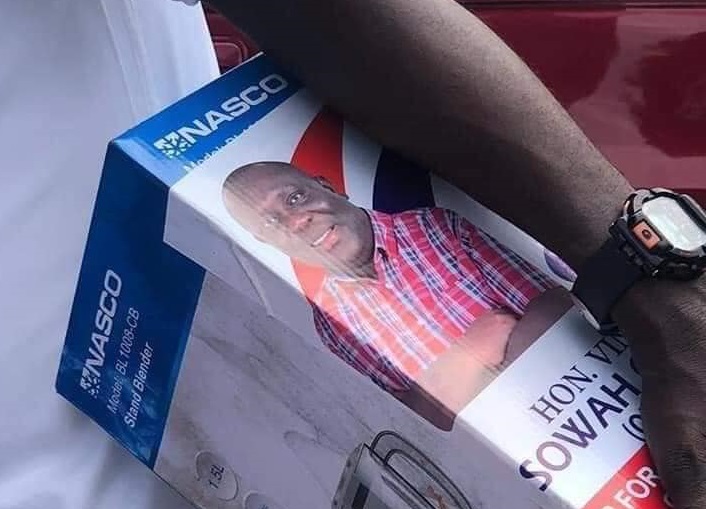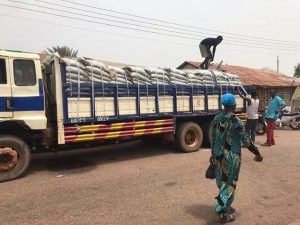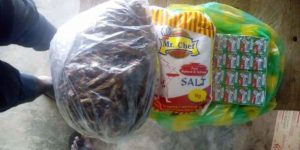A latest Corruption Watch investigation has found that the deputy MASLOC CEO, Hajia Abibata Shani Mahama Zakaria facilitated the use of MASLOC money to allegedly induce delegates in the Yendi Constituency during the recent New Patriotic Party (NPP) parliamentary primaries.
The investigation uncovered that she used state resources for her personal gain just as other candidates were also captured by Corruption Watch inducing delegates with money, machinery and appliances in seven regions monitored by Corruption Watch.
In the Yendi Constituency, aspirants even gave out food packages including a bowl of dried fish, a box of Maggi and a pack of powdered salt.
These are part of findings from widely conducted investigations that were carried out before, during and immediately after the NPP primaries in the Ashanti, Bono, Central, Eastern, Greater Accra, Northern and Western regions.
Issues of interest to Corruption Watch were potential political corruption including, but not limited to, vote buying, abuse of office for personal gains, electoral impropriety which are in contravention of the 1992 Constitution of Ghana; and NPP’s own voting regulations.
In the first of a series of reports, Corruption Watch is publishing findings from two regions – the Northern and Western regions.
Yendi Constituency
In the Yendi Constituency in the Northern Region, Hajia Zakaria exploited her association with the Microfinance and Small Loans Centre (MASLOC) to prosecute her campaign.
MASLOC is a government agency that “provides micro and small loans to startups and businesses” under the state’s poverty alleviation programme.
On Thursday, 21st May, 2020, Hajia Zakaria distributed GH₵ 1000 state money under the MASLOC loans to delegates of the constituency in which she was contesting as a parliamentary aspirant.
In an address to delegates which was captured on video by Corruption Watch undercover investigators, she said although MASLOC loans weren’t to be distributed yet to Ghanaians, she ensured that as deputy CEO of MASLOC loans to her constituents weren’t only distributed to them but also that the number of recipients were increased above what was permitted.
Between the 12th and 14th of June, she also gave three bags of NPK fertilizers to each delegate in the Yendi Constituency.
When Corruption Watch contacted her for her response, she admitted to the findings but insisted that she didn’t err in her decision to give state money to induce delegates because the delegates applied for the loan like every other group.
She contested the primaries against Alhaji Umar Farouk Aliu Mahama, deputy procurement officer at COCOBOD and who is also the son of the late Vice President Aliu Mahama and Alhaji Osman Baba Daney, a former Accountant at the Northern Regional Coordinating Council.
The Yendi contest can arguably be one of the contests in the country where the aspirants spent a lot of resources on the delegates. Each of them employed different tactics/ strategy to entice the delegates individually or as groups.
Accounts of some of the activities that the aspirants engaged in border largely on potential bribery of the delegates for their votes.
These are some of the highlights of the activities the various aspirants engaged in to attract the delegates:
On 13th May, 2020, Alhaji Umar Farouk Aliu Mahama distributed one thousand bags of sugar to the delegates and opinion leaders in the Yendi Constituency; this has been an annual ritual by him since 2017.
On 20th May, 2020, Mr. Aliu Mahama gave about 800 bags of rice to the NPP delegates and opinion leaders in the constituency for the celebration of the Eid-Ul-Fitr. This he has been doing since 2017.
On 13th June, 2020, Mr. Mahama distributed 400 knapsacks, 2400 bottles of weedicides, 600 cutlasses, 400 bottles of anti-snake sprays and 800 bags of fertilizers to delegates in the Yendi Constituency.
When CW contacted him for his response, Mr. Aliu Mahama said he was not feeling well so he would speak on a different occasion. As at the time of filing this report, CW had not received his response.
Alhaji Osman Baba Daney, on Monday 15th June, 2020, through his wife, presented a parcel of food ingredients to each delegate in the Yendi Constituency. The content of the parcel included a bowl of dried fish, a box of Maggi and a pack of powdered salt.
Each delegate was also offered a cash amount of GH₵ 100.
On Thursday, 18th June 2020, Mr. Daney distributed GH₵ 200 to each delegate ‘to help them farm”.
When Corruption Watch contacted Mr. Daney, he confirmed CW’s findings but argued that the content of the envelope he gave delegates was GH₵ 80 and not GH₵ 200. He also denied knowledge of the initial GH₵ 100.
Kwesimintsim Constituency
The case in the Western Region was not different as the primary in the Kwesimintsim Constituency was also fraught with alleged vote buying. Both incumbent MP, Joseph Mensah and his contender Dr. Prince Hamid Armah, who is the Executive Secretary of the National Council for Curriculum and Assessment (NaCCA), allegedly engaged in inducement of delegates.
Dr. Hamid Armah, who won the polls with 222 out of the 389 valid votes, allegedly paid GH₵ 1,500 to each of about 200 delegates on the night before the election. He is also accused of camping some delegates at his residence in Anaji on that night, supplied them with food and drinks until the morning of the election.
Incumbent Joseph Mensah, who polled 167 votes, is also accused of paying GH₵ 1,000 to each of the about 200 delegates a night before the election at his home in Anaji Mount Zion. In addition to the money, he is alleged to have also given a half piece of cloth (six yards) to each female delegate and two brand new singlets to each male delegate.
Response to the allegations
In a telephone conversation with Corruption Watch reporter Frederick Asiamah, Incumbent Joseph Mensah admitted inducing the delegates with the amount of cash and items mentioned. He explained that that is the norm he ‘came to meet’ when he joined politics. He said the system now is that the highest bidder gets the nod and everybody is doing it.
On the other hand, Dr. Hamid Armah did not respond to Corruption Watch’s calls and text messages requesting for his reaction.
Effia Constituency
Still in the Western Region, the Effia Constituency was not left out of the inducement quagmire. The contest in that constituency was between incumbent MP and Deputy Minister of Energy Joseph Cudjoe and challenger Dr. Adwoa Kwagyiriba, a Lecturer at the Takoradi Technical University (TTU).
Mr. Cudjoe, who won the polls with 312 votes, allegedly gave about 300 delegates a standing fan and half piece of cloth (six yards) each at his residence a week before the primaries. In addition, on the eve and day of the election, he allegedly camped about 300 delegates and gave each person GH₵ 1,500 and a 32-inch flat screen Hisense television. Besides these, Mr. Cudjoe in keeping to an alleged promise to pay to delegates whatever amount his opponent gave them, held a meeting with the delegates in the afternoon of the day after the elections and gave GH₵ 400 cedis to each delegate.
Meanwhile, Dr. Adwoa Kwagyirba, who obtained 105 votes, allegedly gave GH₵ 400 and a 32-inch television to each delegate a day before the election.
Response to the allegations
Corruption Watch contacted Mr. Cudjoe but he did not respond to our calls and text messages requesting for his reaction.
On the other hand, when Corruption Watch contacted Dr. Kwagyirba, she denied sharing money and television sets to delegates. However, David Oscar Amoah, who was in-charge of Dr. Kwagyirba’s campaign communications, admitted to the allegations of inducing delegates. Oscar Amoah explained that Dr. Kwagyirba’s campaign shared GH₵ 400 to 200-plus delegates and Nasco 32-inch TV sets to 100-plus delegates.
Credit: Corruption Watch






















